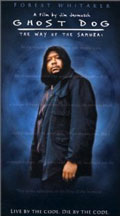
Directed by
Jim Jarmusch
116 minutes
Rated MA
Reviewed by
Bernard Hemingway

Ghost Dog: The Way Of The Samurai
Synopsis: Ghost Dog (Forest Whitaker) carries out a contract for a Mob family who in turn decide to eliminate him. Ghost Dog, a follower of the Japanese code of the Samurai, declares war on the family.
Ever since his memorable 1984 feature, Stranger Than Paradise, a film more successful for its novelty than its inherent merits, I have been doggedly going to every new Jarmusch film, always to be disappointed. Finally my persistence has paid off. Whilst preserving his characteristic deadpan humour and ironic detachment, Jarmusch has applied his distinctive style to what is essentially a re-make of Jean-Pierre Melville's New Wave crime/revenge film classic, Le Samouraï (1967)
Whereas previous Jarmusch films were marked by their absurdist plot elements (a bean counter who goes West and becomes a re-incarnated William Blake in Dead Man (1996), a couple of Japanese Elvis fans on the way to Graceland in 1989's Mystery Train and so on), elements which in their self-conscious cleverness and eccentricity tended to tend to be more exercise in style rather than artistic wholes, the success of Ghost Dog lies in the fact that here Jarmusch has found a harmony of elements, the whole being greater than the sum of its parts. What the esoteric references to the ancient Japanese text Hanakure ("The Way of the Samourai") actually mean is less significant than the fact that they appear to do so, as Jarmusch takes the closely constrained, oblique elements of Melville's black and white original and transforms them into a full-blown theatrical work.
Jarmusch balances the cross-cultural point of reference for Ghost Dog's view of violence and the world with the intra-cultural reference to the violence of American cartoon shows (perhaps slightly overdone) and in the final showdown between Ghost Dog and his boss, the Western, that contextualises the gangsters' acts. These are contrasted with differently constituted perceptions that of a French-speaking ice-cream vendor, a book-reading little girl while Jarmusch throws in a couple of wild cards in the form of the classically surreal image of a man building a boat on top of an apartment building and a couple of bear-hunting red-necks with an eclectic panache that at times recalls Pulp Fiction (1994)
As with other Jarmusch films, the soundtrack is prominent and is vital to the hip ambience of the film although this time it is predominantly the rap music of Wu Tang Clan. Whitaker is perfect as the inexorable avenger and the direction is skilfully stylish with some great imagery thanks to Jarmusch's regular cinematographer, Robby Müller. My only criticism is that the ending is not entirely satisfying it being difficult to accept that Louie would come gunning for his retainer as a) he owed his life to him and b) why would he think he could take out Ghost Dog in a face-to-face confrontation.
Still, Ghost Dog is an outstanding work in Jarmusch's career and the revenge movie catalogue

Want more about this film?


Want something different?




